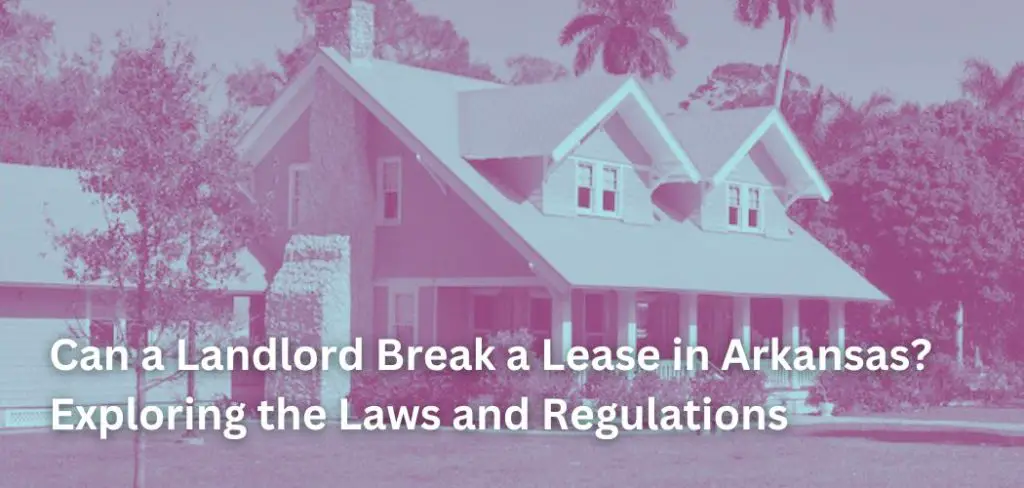Landlords and tenants in Arkansas enter into lease agreements that are legally binding. However, either party may need to break the lease agreement for various reasons.
A landlord may want to break the lease if they have a valid reason such as non-payment of rent or if they want to sell the property.
On the other hand, a tenant may want to break the lease if they find a better place to live or if they need to relocate for work or personal reasons.
While tenants in Arkansas have certain rights and protections, landlords also have legal responsibilities and limitations.
For instance, landlords are required to provide habitable living conditions, make necessary repairs, and give proper notice before entering the rental unit.
Tenants, on the other hand, have the right to privacy, peaceful enjoyment of the rental unit, and protection against discrimination.
Key Takeaways
- Both landlords and tenants in Arkansas have legal rights and obligations when it comes to lease agreements.
- Landlords may be able to break a lease if they have a valid reason, such as non-payment of rent or if they want to sell the property.
- Tenants have certain rights and protections, including the right to habitable living conditions and protection against discrimination.
Understanding Lease Agreements in Arkansas
A lease agreement is a legally binding contract between a landlord and tenant that outlines the terms and conditions of the tenancy.
In Arkansas, a lease can be written or oral, but it is always advisable to have a written lease agreement to avoid disputes.
Under Arkansas law, if a written or oral rental agreement exists, or if payment is accepted as rent, landlords and tenants have automatic rights and responsibilities under Arkansas Code Title 18 Chapters 16 & 17, such as the right to timely rent payments and a livable dwelling.
Landlord responsibilities include providing a safe and habitable dwelling, maintaining the property in a reasonable condition, and complying with local building codes.
The lease agreement should clearly state the rent amount, due date, and payment method.
It should also include the security deposit amount, pet policy, and any other fees or charges.
If the lease agreement is for a fixed term, such as one year, the tenant is obligated to pay rent for the entire term, unless there is a provision in the lease agreement that allows for early termination.

If a tenant violates the lease agreement, the landlord has the right to terminate the lease. However, the landlord must follow the proper legal procedures for lease termination, which may include providing written notice to the tenant and allowing a certain amount of time for the tenant to remedy the violation.
If a tenant wishes to terminate the lease early, they may be able to do so without penalty if there is an early termination clause in the lease agreement.
However, Arkansas law does not require landlords to include such a clause.
If there is no early termination clause, the tenant may still be able to terminate the lease early if the landlord breaches the lease agreement or if the dwelling becomes uninhabitable due to circumstances beyond the tenant’s control.
In summary, understanding lease agreements in Arkansas is crucial for both landlords and tenants.
A lease agreement should clearly outline the terms and conditions of the tenancy, including rent, security deposit, and any fees or charges.
If either party wishes to terminate the lease, they must follow the proper legal procedures outlined in Arkansas landlord-tenant law.
Tenant Rights and Protections
Tenants in Arkansas are granted certain rights and protections under state law. These rights and protections cover a wide range of issues, including discrimination, security deposits, habitability, landlord retaliation, early termination, inspection, grace period, warranty of habitability, domestic abuse, privacy violation, and more.
One of the most important rights afforded to tenants in Arkansas is the right to a habitable dwelling.
This means that landlords are required to maintain rental units in a safe and livable condition.
If a landlord fails to make necessary repairs, tenants may be able to withhold rent or terminate the lease without penalty. Additionally, tenants have the right to a grace period of five days to pay rent before a landlord can initiate eviction proceedings.
Arkansas law also prohibits landlords from retaliating against tenants who exercise their legal rights.
For example, a landlord cannot evict a tenant in retaliation for filing a complaint about a housing code violation.
Tenants who believe they have been retaliated against can file a complaint with the Arkansas Attorney General’s office.
Tenants in Arkansas are also protected against discrimination under the Fair Housing Act. Landlords cannot refuse to rent to tenants based on their race, color, national origin, religion, sex, familial status, or disability.
Additionally, tenants who are victims of domestic violence, sexual assault, or stalking may be able to terminate their lease early without penalty under the Arkansas Victim Protection Act.
Finally, active service members who are deployed or permanently change station may be able to terminate their lease early under the Servicemembers Civil Relief Act. Landlords who violate this law may be subject to fines and other penalties.
Overall, tenants in Arkansas have a number of important rights and protections under state and federal law. By understanding these rights and protections, tenants can protect themselves from landlord abuse and ensure that they are treated fairly and lawfully.
Landlord Responsibilities and Limitations
Under Arkansas law, landlords have certain responsibilities and limitations when it comes to breaking a lease agreement. Here are some of the key points to keep in mind:
Notice Requirement
If a landlord wants to terminate a lease agreement, they must provide written notice to the tenant. The notice must include the reason for the termination and the date by which the tenant must vacate the property. The amount of notice required depends on the reason for the termination and the terms of the lease agreement. For example, if the tenant has failed to pay rent, the landlord must provide a 3-day notice. If the tenant has violated the lease agreement in some other way, the landlord must provide a 14-day notice.
Health and Safety
Landlords have a responsibility to ensure that their rental property is safe and habitable. This means that they must maintain the property in good condition, make necessary repairs, and provide essential services such as heat and hot water. If a landlord fails to meet these obligations, the tenant may have grounds to break the lease agreement.
Rent Control
Arkansas does not have rent control laws, which means that landlords are free to raise the rent as much as they want. However, they must provide written notice of at least one rental period before raising the rent. This rule applies to both oral and written leases.
Late Fees
Landlords may charge late fees for rent that is not paid on time. However, the fees must be reasonable and cannot exceed 10% of the rent amount. Additionally, landlords cannot charge late fees until the rent is at least 5 days past due.
Evictions
If a tenant fails to pay rent or violates the lease agreement, the landlord may seek to evict them. However, landlords must follow the proper legal procedures and cannot take matters into their own hands. For example, they cannot change the locks or shut off utilities to force the tenant to leave.
Penalty for Breaking the Lease
If a landlord breaks a lease agreement without a valid reason, they may be liable for damages. This could include the cost of finding a new place to live, moving expenses, and any additional rent that the tenant must pay as a result of the breach.
Overall, landlords in Arkansas have certain responsibilities and limitations when it comes to breaking a lease agreement. By understanding these rules, both landlords and tenants can protect their rights and avoid legal disputes.
Termination of Lease by Landlord
In Arkansas, a landlord may terminate a lease if the tenant has breached the lease agreement.
The landlord must give the tenant a written notice to vacate the premises. The notice must state the reason for termination and the date the tenant must vacate the property.
The time period for the notice depends on the reason for termination. For example, if the tenant has not paid rent, the notice period is three days.
If the tenant has engaged in prostitution, illegal gambling, or other illegal activities on the property, the notice period is five days. If the tenant has failed to comply with the lease agreement in any other way, the notice period is 14 days.

If the tenant fails to vacate the property by the date specified in the notice, the landlord may file an unlawful detainer action in court.
The court will schedule a hearing, and if the judge finds in favor of the landlord, the tenant will be evicted from the property.
However, there are some situations where a tenant may terminate a lease early without penalty.
For example, if the tenant is on active military duty and is relocated due to deployment or a permanent change of station, they may break the lease early under federal law.
Additionally, if the landlord breaches the lease agreement, the tenant may be able to terminate the lease early.
It is important to note that a landlord cannot terminate a lease in retaliation for a tenant exercising their legal rights, such as reporting a code violation or requesting a repair. If a landlord attempts to terminate a lease in retaliation, the tenant may have legal recourse.
In summary, a landlord in Arkansas can terminate a lease if the tenant breaches the lease agreement, but must provide a written notice and follow the appropriate notice period. Tenants may also terminate a lease early in certain situations, such as active military duty or landlord breach of the lease agreement. Retaliation by a landlord is illegal and can result in legal action by the tenant.
Legal Processes and Recourses
In Arkansas, a landlord has the right to terminate a lease for any reason by providing one rental period’s notice for an oral lease or according to the terms of a written lease. Even model tenants may be subject to having their lease terminated. However, tenants also have legal recourse if their landlord violates the terms of the lease or Arkansas law.
Security Deposit and Penalties
When a tenant moves out, the landlord must return the security deposit within 60 days or provide an itemized list of damages that justify withholding the deposit. If the landlord fails to do so, the tenant can sue for up to twice the amount of the deposit plus attorney fees.
Evictions and Unlawful Detainers
If a tenant fails to pay rent or violates the lease agreement, the landlord can file an unlawful detainer action in court to evict the tenant. The landlord must give the tenant a written notice to vacate the premises before filing the action. If the tenant does not vacate the premises, the landlord can obtain a writ of possession to remove the tenant and his or her property.
Breaking a Lease
If a tenant breaks a lease, the landlord can sue for damages, including unpaid rent and the cost of finding a new tenant. However, if the tenant breaks the lease because of domestic violence or sexual assault, the tenant can terminate the lease early without penalty under Arkansas law.

Arkansas Small Claims Court
If a tenant believes that the landlord has violated the lease agreement or Arkansas law, the tenant can file a claim in small claims court. Small claims court is a simplified court process that allows individuals to represent themselves without an attorney. The court can award damages up to $5,000.
Legal Advice
Tenants who need legal advice can contact the prosecuting attorney or city attorney in their county or seek assistance from a legal aid organization. It is important to seek legal advice before taking any action against a landlord to ensure that the tenant’s rights are protected.
Agent
A landlord can hire an agent to manage the property and enforce the lease agreement. The agent must follow the same rules and regulations as the landlord and can be held liable for any violations of the lease agreement or Arkansas law.
Practical Advice for Landlords and Tenants
When it comes to breaking a lease in Arkansas, both landlords and tenants should be aware of their rights and obligations. Here are some practical tips for both parties:
For Landlords
- If you need to break a lease, make sure you have a valid reason for doing so. For example, if the tenant has violated the lease agreement or engaged in criminal activity on the property, you may have grounds for termination.
- If you want to sell the property, you may be able to terminate the lease “with cause” if the tenant is not paying rent or is not taking good care of the property.
- If you need to raise the rent, make sure you follow the proper procedures and give the tenant adequate notice. Under Arkansas law, you must give at least 30 days’ notice before increasing the rent.
- Be sure to respect the tenant’s privacy and personal information. You cannot enter the property without the tenant’s permission, except in certain emergency situations.
For Tenants
- If your landlord wants to break the lease, make sure you understand your rights. In most cases, the landlord must have a valid reason for doing so, and must give you adequate notice.
- If you need to break the lease, try to negotiate with the landlord. You may be able to come to an agreement that is mutually beneficial.
- If you are having trouble paying rent, talk to your landlord as soon as possible. You may be able to work out a payment plan or other arrangement.
- Be aware of your rights under Arkansas law. For example, landlords cannot discriminate against tenants based on race, gender, religion, or other protected characteristics.
For more information on Arkansas landlord-tenant law, visit the Nolo website or consult with a qualified attorney.
